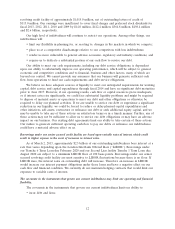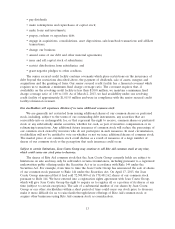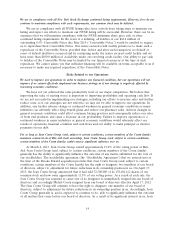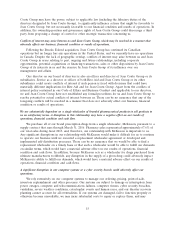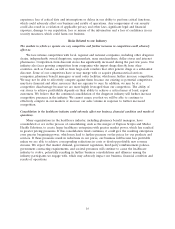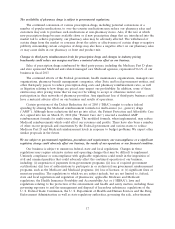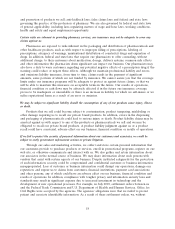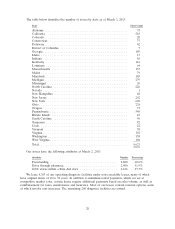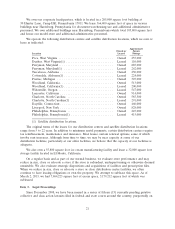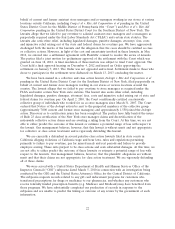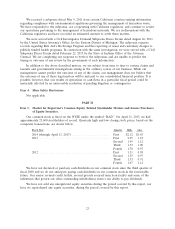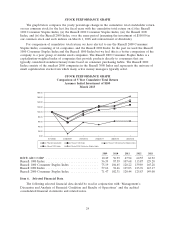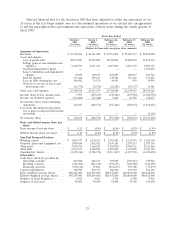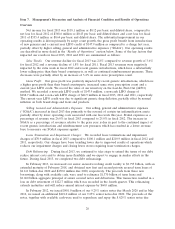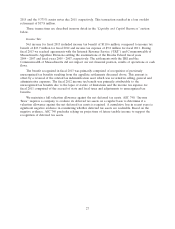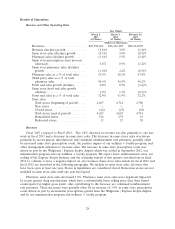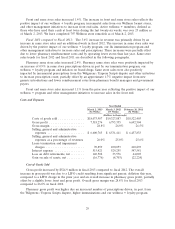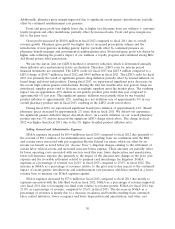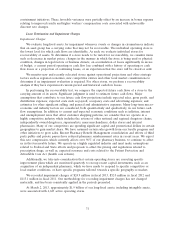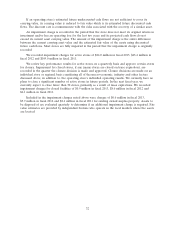Rite Aid 2013 Annual Report Download - page 23
Download and view the complete annual report
Please find page 23 of the 2013 Rite Aid annual report below. You can navigate through the pages in the report by either clicking on the pages listed below, or by using the keyword search tool below to find specific information within the annual report.behalf of current and former assistant store managers and co-managers working in our stores at various
locations outside California, including Craig et al v. Rite Aid Corporation et al pending in the United
States District Court for the Middle District of Pennsylvania (the ‘‘Court’’) and Ibea et al v. Rite Aid
Corporation pending in the United States District Court for the Southern District of New York. The
lawsuits allege that we failed to pay overtime to salaried assistant store managers and co-managers as
purportedly required under the Fair Labor Standards Act (‘‘FLSA’’) and certain state statutes. The
lawsuits also seek other relief, including liquidated damages, punitive damages, attorneys’ fees, costs
and injunctive relief arising out of the state and federal claims for overtime pay. We have aggressively
challenged both the merits of the lawsuits and the allegation that the cases should be certified as class
or collective actions. However, in light of the cost and uncertainty involved in these lawsuits, in May
2012, we entered into a settlement agreement with Plaintiffs’ counsel to resolve the series of lawsuits.
The parties filed a joint motion for preliminary approval of the settlement with the Court which was
granted on June 18, 2012. A final resolution of these matters was subject to final Court approval. The
Court held a final approval hearing on December 4, 2012 and issued an Order approving the
settlement on January 7, 2013. The Order was not appealed and is final. Settlement funds to those who
chose to participate in the settlement were disbursed on March 13, 2013 concluding the matter.
We have been named in a collective and class action lawsuit, Indergit v. Rite Aid Corporation et al
pending in the United States District Court for the Southern District of New York, filed purportedly on
behalf of current and former store managers working in our stores at various locations around the
country. The lawsuit alleges that we failed to pay overtime to store managers as required under the
FLSA and under certain New York state statutes. The lawsuit also seeks other relief, including
liquidated damages, punitive damages, attorneys’ fees, costs and injunctive relief arising out of state and
federal claims for overtime pay. On April 2, 2010, the Court conditionally certified a nationwide
collective group of individuals who worked for us as store managers since March 31, 2007. The Court
ordered that Notice of the Indergit action be sent to the purported members of the collective group
(approximately 7,000 current and former store managers) and approximately 1,550 joined the Indergit
action. Discovery as to certification issues has been completed. The parties have fully briefed the issues
of Rule 23 class certification of the New York store manager claims and decertification of the
nationwide collective action claims and are awaiting a ruling from the Court. At this time, we are not
able to either predict the outcome of this lawsuit or estimate a potential range of loss with respect to
the lawsuit. Our management believes, however, that this lawsuit is without merit and not appropriate
for collective or class action treatment and is vigorously defending this lawsuit.
We are currently a defendant in several putative class action lawsuits filed in state courts in
California alleging violations of California wage and hour laws, rules and regulations pertaining
primarily to failure to pay overtime, pay for missed meals and rest periods and failure to provide
employee seating. These suits purport to be class actions and seek substantial damages. At this time, we
are not able to either predict the outcome of these lawsuits or estimate a potential range of loss with
respect to the lawsuits. Our management believes, however, that the plaintiffs’ allegations are without
merit and that their claims are not appropriate for class action treatment. We are vigorously defending
all of these claims.
We were served with a United States Department of Health and Human Services Office of the
Inspector General (‘‘OIG’’) subpoena dated March 5, 2010 in connection with an investigation being
conducted by the OIG and the United States Attorney’s Office for the Central District of California.
The subpoena requests records related to any gift card inducement programs for customers who
transferred prescriptions for drugs or medicines to our pharmacies, and whether any customers who
receive federally funded prescription benefits (e.g. Medicare and Medicaid) may have benefited from
those programs. We have substantially completed our production of records in response to the
subpoena and are unable to predict the timing or outcome of any review by the government of such
information.
22


